US Says Will Increase Pressure On China To Stop Iran Oil Imports
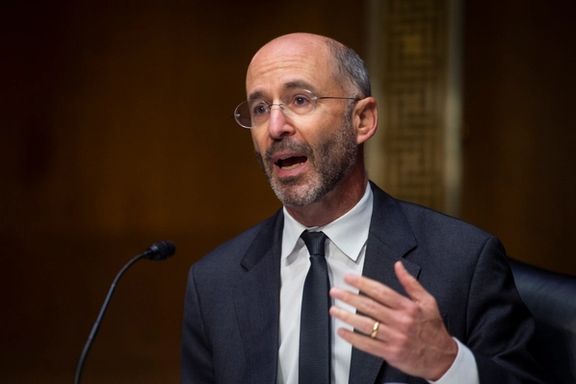
The Biden Administration will pressure China to stop importing Iranian crude oil, US Special Envoy for Iran Robert Malley told Bloomberg television on Tuesday.

The Biden Administration will pressure China to stop importing Iranian crude oil, US Special Envoy for Iran Robert Malley told Bloomberg television on Tuesday.
“China is the main destination of illicit exports by Iran” and the United States will intensify talks to dissuade Beijing not to break US sanctions, Malley told Bloomberg.
The Trump administration imposed third-party sanctions on Iran’s oil exports after it withdrew from the 2015 nuclear accord, but China increased its purchases when President Joe Biden got elected and pledged to return to the agreement known as the JCPOA.
Latest estimates are that small Chinese refineries are buying at least 700,000 barrels per day at discounted prices through middlemen and illicit channels. Beijing does not officially report the Iranian oil cargoes as they are usually labeled as shipments from other countries.
Some reports say Iranian oil shipments increased in December, but it is not clear if exports to China have surged or more exports are sent elsewhere, such as Venezuela.
Critics have been accusing the Biden administration of not exerting enough pressure on Beijing to stop imports from Iran, hoping that China will play a positive role in nuclear talks with Tehran. These negotiations came to a halt last September and since then the US and its European allies have adopted tougher positions against Iran, for its human rights violations and supplies of kamikaze drones to Russia.
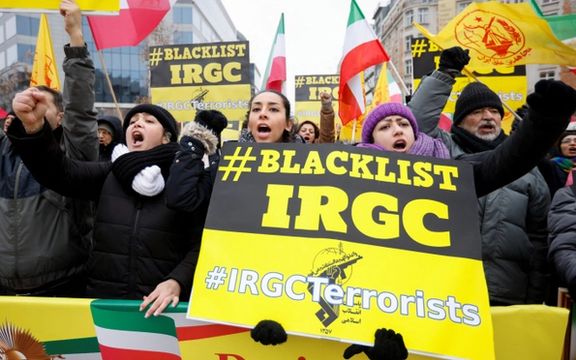
Iran slammed new sanctions imposed by the European Union and Britain and said it would retaliate, although the EU stopped short of listing the IRGC as terror group.
"The Islamic Republic will soon announce the list of new sanctions against the human rights violators of EU and England," Iran's Foreign Ministry Spokesperson Nasser Kanaani said in a statement.
At the same time, a Tehran newspaper carried the headline, “Europe stopped at Iran’s redline.” Some hardliners expounded on this argument saying that Tehran’s threats to Europe not to designate the IRGC had worked and it had stopped short of designating the Revolutionary Guard as a terrorist organization.
A newspaper under the control of an influential regime insider said on Tuesday that the EU sanctions “had done most of the job,” short of officially listing the IRGC as a terror group.
The paper, Farhikhtegan, said to be affiliated with Ali Akbar Velayati, a close advisor to Supreme Leader Ali Khamenei wrote the a vote at the European Parliament last week labeling the IRGC as terrorist had done the damage. This will have its negative impact on Iran’s commercial relations with the world, the newspaper said.
The European Union imposed sanctions on more than 30 Iranian officials and organizations, including units of the powerful Revolutionary Guards, blaming them for a "brutal" crackdown on unrest and other human rights abuses.
The United States and Britain also issued new sanctions against Iran, reflecting a deterioration in the West's already dire relations with Tehran.
The sanctions are the latest response to Iran's deadly clampdown on unrest after the death of young Iranian Kurdish woman Mahsa Amini in morality police custody in September.
The Biden administration Monday imposed sanctions on Iran’s Islamic Revolutionary Guard (IRGC) Cooperative Foundation and some senior Iranian officials.
The US Treasury said in a statement that the new action targeted a "key economic pillar of the IRGC, which funds much of the regime’s brutal suppression; as well as senior security officials coordinating Tehran’s crackdown at the national and provincial levels."
The Treasury described the IRGC Cooperative Foundation as an economic conglomerate established by senior officials of the group to manage its investments and presence in sectors of Iran's economy.
British sanctions included an asset freeze on Iranian deputy prosecutor general Ahmad Fazelian, who the British foreign office said was responsible for an unfair judicial system that used the death penalty for political purposes. Other individuals affiliated with the IRGC were also sanctioned.
Iran's security forces, mainly controlled by the Revolutionary Guard, and supported by the hardliner judiciary have killed around 500 civilians since anti-regime protests erupted in September.
Iranian activists in the West reacted very negatively on social media to the EU decision not to designate the IRGC as a whole, mostly blaming EU foreign policy chief Josep Borrell for preventing it with the hope of more nuclear talks with Iran.
Iranian officials were issuing a whole series of threats to Europe in the past week, including targeting European military forces in the Middle East and closing the Hormuz Strait to European commercial shipping. That is one sort of threat tactic that has been used so often by Islamic Republic officials that it has lost its luster.
A member of the Iranian parliament on Tuesday raised the issue, saying that threatening to close Hormuz “has become silly,” and no one believes the threat anymore.
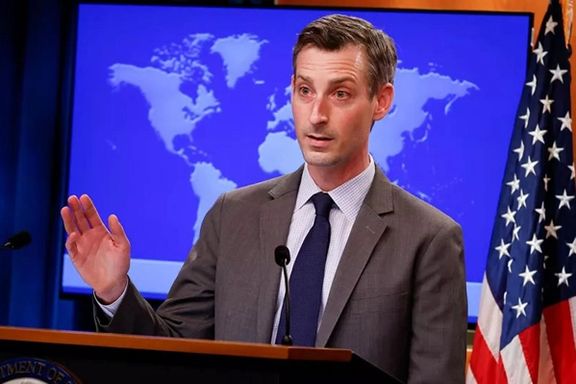
The United States has lauded the punitive measures by European countries against officials of the Islamic Republic’s Revolutionary Guards.
In response to our correspondent, US State Department Spokesperson Ned Price said Wednesday, “We applaud our European allies' latest designations of IRGC officials,” noting that “Our European allies recognize the threat and challenges posed by the IRGC and Iran.”
“We've enjoyed exceptionally close cooperation and coordination with Europe on confronting these challenges,” he added.
About the possibility of resuming talks to revive the 2015 nuclear deal, he said that “The JCPOA has not been on the agenda for months. Iran consistently turned its back on chances to pursue mutual return to JCPOA.”
He noted that “As a result of what Iran is doing around the world and to its own people, we've focused on sending clear messages to Iran.”
“Stop killing your people, stop sending drones to Russia,” Price stated addressing the Islamic Republic.
The West on Monday stepped up pressure on Iran over its crackdown on protests and arms supply for the Russian invasion of Ukraine as the US, European Union and United Kingdom imposed fresh sanctions on Tehran.
“Concurrently with the United Kingdom and the European Union, the United States today is taking further action to press for accountability for the Iranian regime’s human rights abuses by imposing sanctions on 10 additional Iranian individuals and one additional Iranian entity,” read a statement by Secretary of State Antony J. Blinken.
This is the ninth round of designations targeting actors responsible for the crackdown since the nationwide protests began in September 2022.
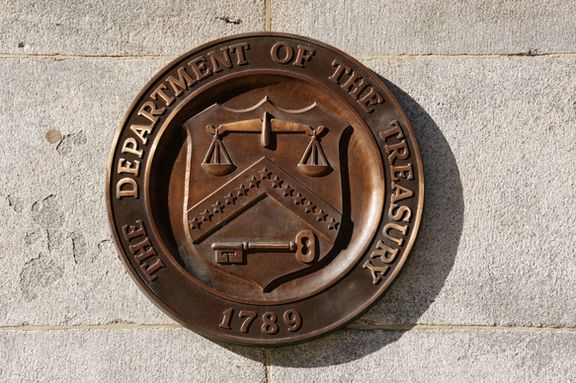
The Biden administration Monday imposed sanctions on Iran’s Islamic Revolutionary Guard (IRGC) Cooperative Foundation and some senior Iranian officials.
The measure was meant to step up pressure on Tehran over its deadly crackdown on protests as regime security forces have killed and seriously injured hundreds of civilians.
The is the latest move taken in coordination with Britain and the European Union to denounce the regime’s deadly clampdown on protests following the death of Mahsa Amini in police custody in September.
The US Treasury said in a statement that the new action targets a "key economic pillar of the IRGC, which funds much of the regime’s brutal suppression; as well as senior security officials coordinating Tehran’s crackdown at the national and provincial levels."
The Treasury described the IRGC Cooperative Foundation as an economic conglomerate established by senior officials of the group to manage its investments and presence in sectors of Iran's economy.
The IRGC Cooperative Foundation was previously designated by Washington under different sanctions but was designated under a human rights authority in Monday's action.
Also targeted were five of the IRGC Cooperative Foundation's board members, Deputy Minister of Intelligence and Security Naser Rashedi, and four senior IRGC commanders in Iran.
The action freezes any US assets of those designated and generally bars Americans from dealing with them.
The UK imposed sanctions on more Iranian individuals and entities on Monday over the country's "brutal repression" of its people. The European Union also introduced new sanctions against Iran on Monday for a "brutal and disproportionate use of force" against protesters.

Britain on Monday sanctioned more Iranian figures over human rights violations including the recent execution of British-Iranian dual national Alireza Akbari.
The sanctions included an asset freeze on Iranian deputy prosecutor general Ahmad Fazelian, who the British foreign office said was responsible for an unfair judicial system that used the death penalty for political purposes.
Others sanctioned include Kiyumars Heidari, commander in chief of Iran's ground forces; Hossein Nejat, deputy commander of the Islamic Revolutionary Guard Corps; the Basij Resistance Force and its deputy commander, Salar Abnoush.
Iran's security forces mainly controlled by the Revolutionary Guard and supported by the hardliner judiciary have killed around 500 civilians since anti-regime protests erupted in September.
The Basij Cooperative Foundation, linked to the Basij militia, and Qassem Rezaei, deputy commander of Iran's law enforcement forces, were also sanctioned.
"Those sanctioned today, from the judicial figures using the death penalty for political ends to the thugs beating protestors on the streets, are at the heart of the regime’s brutal repression of the Iranian people," British foreign minister James Cleverly said.
"The UK and our partners have sent a clear message through these sanctions that there will be no hiding place for those guilty of the worst human rights violations."
The European Union also imposed new sanctions on Iranian regime officials and entities for rights violations and the delivery of killer drones to Russia.
With reporting by Reuters
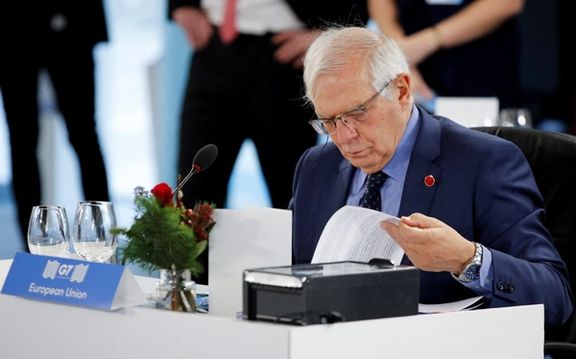
The European Union cannot list Iran's IRGC as a terrorist entity until an EU court has determined that they are, the block's foreign policy chief said Monday.
EU ministers, however, on Monday agreed on a new package of sanctions against Iran, the Swedish EU presidency said.
"Ministers adopted a new package of sanctions against Iran, targeting those driving the repression. The EU strongly condemns the brutal and disproportionate use of force by the Iranian authorities against peaceful protesters," the presidency said in a tweet, without giving further detail.
Spokesman of Iran foreign ministry Nasser Kanaani in Tehran had said earlier in the day that the Iranian government is not without option if the EU lists the IRGC as a terrorist organization. He added that any move against the Revolutionary Guard will be regarded as a hostile act against the security of the Islamic Republic and “its results will affect the offenders.”
Iranian officials, apparently concerned over a possible move by the EU following an overwhelming vote by the European Parliament last week, have been implicitly threatening the block with violent consequences.
The European Parliament has called on the EU to list the Revolutionary Guards as a terrorist entity, blaming it for the repression of domestic protests and the supply of drones to Russia.
"It is something that cannot be decided without a court, a court decision first. You cannot say I consider you a terrorist because I don't like you," Josep Borrell, the EU's high representative for foreign affairs, told reporters as he arrived for a meeting of EU foreign ministers in Brussels.
He said the court of an EU member had to issue a concrete legal condemnation before the EU itself could act.
There have been numerous Iranian terror acts in Europe, where courts have indicted top officials. In addition, IRGC’s record in organizing attacks elsewhere are well-documented. Critics say that Borrell is focused on re-starting nuclear talks with Iran after the previous long round of negotiations in 2021-2022 ended last September without success.
The United States has said it is not pursuing the revival of the 2015 nuclear deal, or the JCPOA, and instead its attention is on the popular movement in Iran and on Tehran’s supply of kamikaze drones to Russia.
The IRGC was set up shortly after the 1979 Islamic Revolution to protect the Shi’ite clerical ruling system and provide a counterweight to the regular armed forces.
It has an estimated 125,000-strong military with army, navy and air units. It also commands the Basij religious militia, a volunteer paramilitary force loyal to the clerical establishment which is often used to crack down on anti-government protests.
Arriving at the same meeting, German Foreign Minister Annalena Baerbock said the EU must talk about putting the IRGC on the sanctions list.
"We still see in Iran a brutal regime against its own population. The Iranian regime, the Revolutionary Guards terrorize their own population day after day," Baerbock said.
Tehran has also detained several European nationals and the bloc has become increasingly critical of its continuing violent crackdown on protesters and the transfer of Iranian drones to Russia.
The Iranian diaspora in Europe has become politically active since popular protests broke out last year and has been putting pressure on European politicians to act against the clerical regime in Iran.
With reporting by Reuters